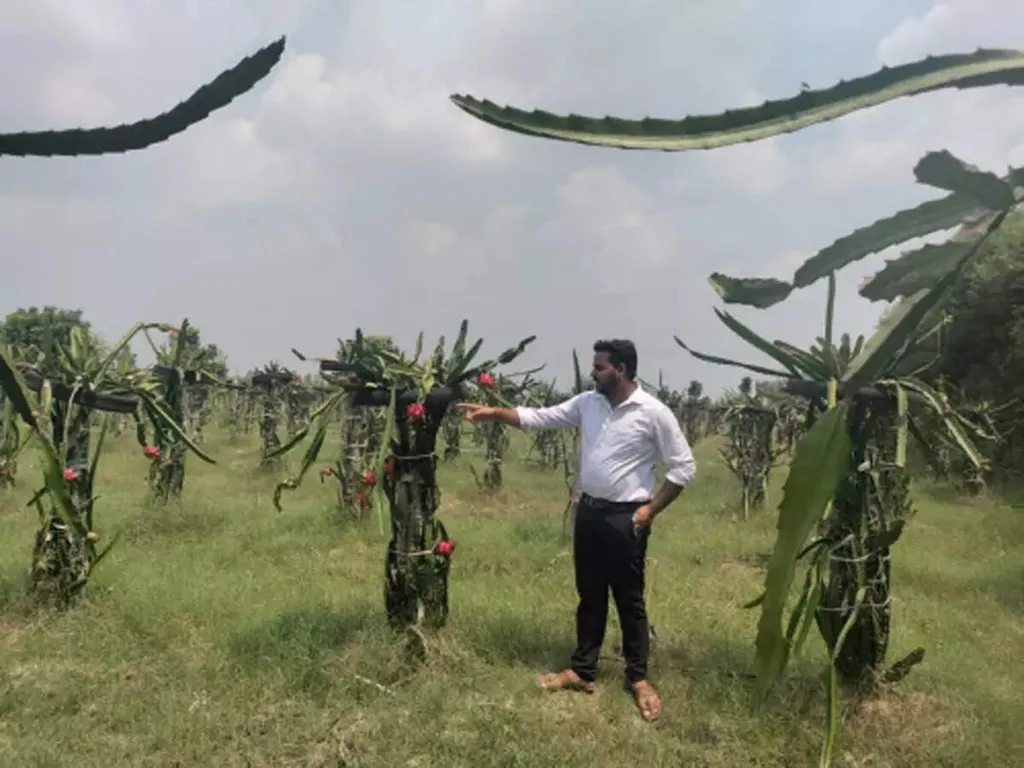In the heart of India’s agricultural landscape, a groundbreaking study conducted at the Chandra Shekhar Azad University of Agriculture and Technology in Kanpur, Uttar Pradesh, is set to revolutionize the way we cultivate dragon fruit. The research, led by Ravi Pratap, delves into the transformative potential of vermicompost and biofertilizers on the physico-chemical attributes of dragon fruit (Hylocereus costaricensis), offering promising insights for sustainable and commercially viable agricultural practices.
The study, published in ‘The Indian Journal of Agricultural Sciences’ (which translates to ‘भारतीय कृषि विज्ञान पत्रिका’), explored the impact of 11 different treatments combining vermicompost and biofertilizers on dragon fruit plants. The treatments ranged from control groups to combinations of vermicompost with Azotobacter, Azospirillum, and phosphate solubilizing bacteria. The results were striking, with the combination of vermicompost (0.5 kg/plant) and Azospirillum (50 g/plant) with phosphate solubilizing bacteria (50 g/plant) yielding the most significant improvements in both physical and biochemical parameters.
“Our findings indicate that the synergistic use of vermicompost and biofertilizers can substantially enhance the quality and yield of dragon fruit,” said Ravi Pratap, the lead author of the study. The treatment not only increased the fruit’s length, diameter, weight, and volume but also improved its specific gravity, pulp weight, and peel weight. Notably, the pulp-to-peel ratio, a critical factor for commercial appeal, was also optimized.
The biochemical parameters were equally impressive. The total soluble solids content, titratable acidity, ascorbic acid content, total sugars, reducing sugar, and non-reducing sugar all saw significant boosts. “These improvements not only enhance the nutritional value of the fruit but also make it more attractive to consumers and markets,” added Pratap.
The implications of this research are far-reaching, particularly for the agricultural and commercial sectors. As the demand for dragon fruit continues to rise globally, farmers and agribusinesses are constantly seeking ways to improve yield and quality while maintaining sustainability. The use of vermicompost and biofertilizers presents a cost-effective and eco-friendly solution that can potentially transform dragon fruit cultivation.
“This study opens up new avenues for sustainable agriculture,” said a spokesperson from the Chandra Shekhar Azad University of Agriculture and Technology. “By integrating vermicompost and biofertilizers into standard agricultural practices, we can achieve higher yields, better quality produce, and a healthier environment.”
The research not only highlights the potential of vermicompost and biofertilizers but also underscores the importance of innovative agricultural practices in meeting the growing demand for high-quality produce. As the world grapples with the challenges of climate change and food security, studies like this offer a beacon of hope and a pathway to a more sustainable future.
In the realm of agritech, this study serves as a testament to the power of scientific research in driving agricultural advancements. The findings are poised to influence future developments in the field, encouraging farmers and researchers alike to explore the benefits of vermicompost and biofertilizers. As the agricultural sector continues to evolve, the integration of such sustainable practices will be crucial in shaping a more resilient and productive future.

